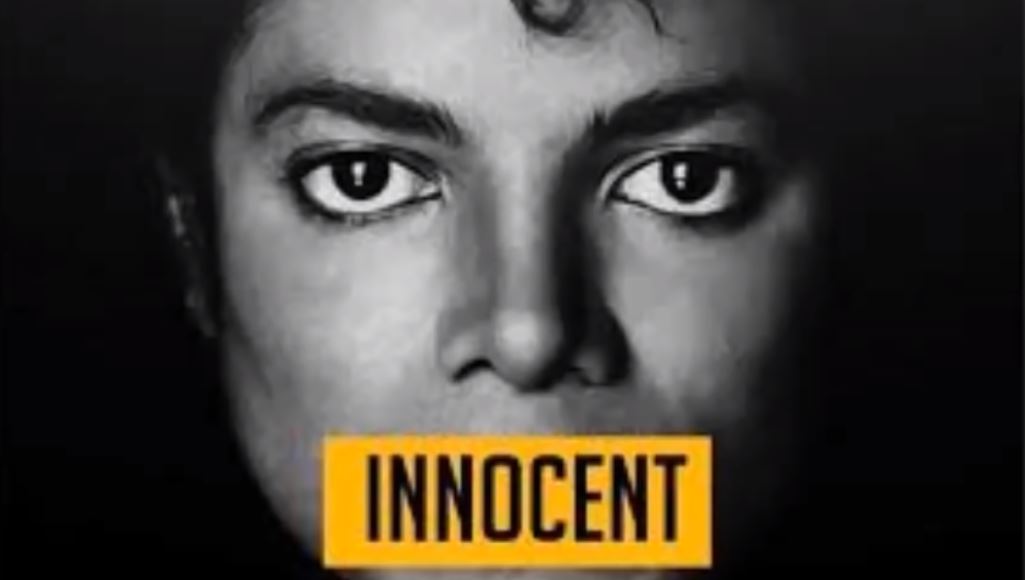BY
VIVIAN LEE
April 18, 2019
CLICK FOR PART II
The new pseudo-documentary, ŌĆ£Leaving Neverland,ŌĆØ directed by Dan Reed, hit the scene with a four-hour screening at┬ĀSundance┬Āon January 25, 2019. The film was then aired with great fanfare on HBO on two consecutive nights, March 3 (part 1) and March 4 (part 2). Following part 2, HBO featured a one-hour special with Oprah, ŌĆ£Oprah Winfrey Presents: After NeverlandŌĆØ (also shown on her channel┬ĀOWN).[1]
The stars of the film are Wade Robson and James Safechuck, alleged victims of childhood sexual abuse by Michael Jackson, with supporting roles for members of their families. ŌĆ£After NeverlandŌĆØ features Oprah in conversation with Robson and Safechuck. For a total of five hours, we hear their grisly stories of masturbation, French kissing, pornography, and anal rape, in vivid and horrifying detail, but without a shred of corroborating evidence.
The mainstream media was all over this extravaganza, and continues to cover it, despite an increasing number of problems regarding the allegations. With some exceptions, such as Macaulay Culkin┬Āand Diana Ross, the big stars are hanging back, reluctant to speak out in JacksonŌĆÖs defense, although this may change, as the situation is still developing.
This reticence is due to the current #MeToo climate requiring us to #BelieveSurvivors, and also the animus of the press toward The King of Pop ŌĆō widely considered┬ĀThe Greatest Entertainer of All Time. The new accusations against Jackson are just the latest (all the others having been proved untrue), this time targeting a man who cannot defend himself since he died in 2009. With ŌĆ£Leaving Neverland,ŌĆØ #MeToo vaults into the great beyond, such that anyone and everyone can now be defamed whether guilty or not, whether alive or dead.[2]
Schlockumentary
ŌĆ£Leaving NeverlandŌĆØ is not a real documentary, but a slick promotional film purporting to tell the true stories of the accusers, which are completely unverified. We are supposed to believe these stories, even though both men have stated repeatedly in past interviews and under oath that they had never been molested by Jackson.
The┬ĀJackson Estate┬Ācalled the film ŌĆ£a one-sided marathon of unvetted propaganda to shamelessly exploit an innocent man no longer here to defend himself.ŌĆØ They have┬Āsued HBO┬Āfor $100 million for breach of a nondisparagement clause in a 1992 contract. When Reed was asked why he did not seek input from members of the Jackson family or MichaelŌĆÖs close friends,┬Āhe demurred, saying, ŌĆ£This isnŌĆÖt a film about Michael Jackson; itŌĆÖs a film about Wade Robson and James Safechuck.ŌĆØ Reed did not find it necessary to seek other ŌĆ£eyewitnesses,ŌĆØ since no one else was in the room when the two boys were supposedly being molested.
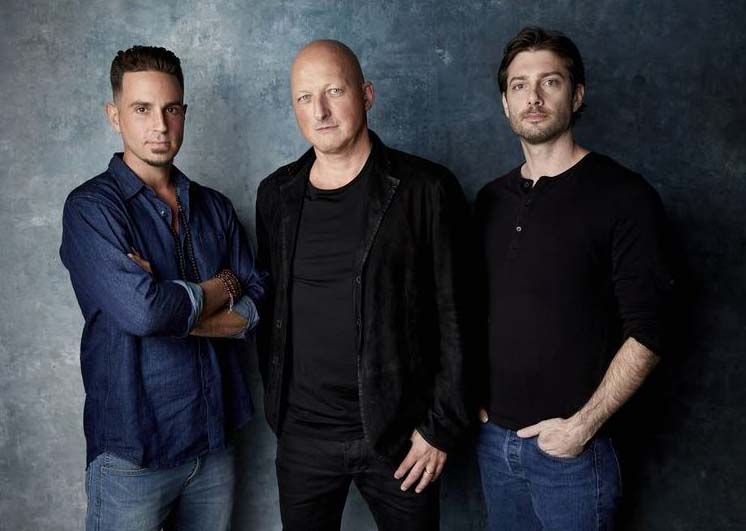 Wade Robson, Dan Reed, and James Safechuck in a promotional photo for the Sundance premier of ŌĆ£Leaving Neverland.ŌĆØ
Wade Robson, Dan Reed, and James Safechuck in a promotional photo for the Sundance premier of ŌĆ£Leaving Neverland.ŌĆØ
Reed asks, ŌĆ£Well, what does the family know about this sexual abuse that happened? Do you think they know about the sexual abuse? … I donŌĆÖt believe they do.ŌĆØ As to why the allegations were presented in such a graphic manner, he says he found this necessary:
ŌĆ£For many years, Jackson got away with this image of being a bit of a child himself, and, you know, being very affectionate with children, and I wanted to make sure that people understood this wasnŌĆÖt over-enthusiastic, you know, kissing or cuddling. This was sex. This was the kind of sex adults have, but he was having it with a little child.ŌĆØ
Reed claims that throughout the two years of making the film, he did a ŌĆ£deep diveŌĆØ into prior allegations of sexual abuse against Jackson. He says he ŌĆ£looked for anything that could cast doubt or undermine Wade and JamesŌĆÖs storyŌĆØ and ŌĆ£found nothing at all.ŌĆØ As will be apparent, either he didnŌĆÖt know where to look, or he is lying, along with the two alleged victims. Asked about how he came to make the film, Reed says it was a story he ŌĆ£stumbled acrossŌĆØ in a footnote about Robson and Safechuck litigating against the Jackson estate. Who knew that a footnote reference could be so prolific?
Reed has made the rounds of the networks, promoting the film aggressively with a smirk on his face. ┬ĀThis is schlock journalism at its most abhorrent and sensational, meant to overwhelm the viewer with gross, shocking details in the absence of actual evidence.
The lurid effect is further enhanced by clever camera work, multiple takes, background music, images of the men as children, and subtle props, not to mention fine acting by the filmŌĆÖs stars. This is child pornography, once removed, masquerading as a documentary. This is beginning to dawn on HBO, which has cut the filmŌĆÖs run short, and Oprah, who has muted the special on her website and deleted it from her social media accounts
Reed has indicated that he would like to make more films about the supposed victims of JacksonŌĆÖs sexual abuse: Jordan Chandler, who claimed to have been molested in 1993 at age 13, and Gavin Arvizo, allegedly abused in 2003 at the same age. These two cases led to an inquiry and settlement (1993), and the arrest of Jackson (2003) and his acquittal (2005). We wish Reed good luck with this project, as Jackson was exonerated both times. However, the legal proceedings, invasions of privacy, and adverse publicity took a terrible toll on Jackson, leading, as some think, to his 2009 death. These earlier cases are bizarre in their particulars, and are typically reported inaccurately in the press. Although they cannot be explored here in detail, they are related to the new allegations and are therefore summarized below.
Jordan Chandler and the 1993 Settlement
Jackson met Jordan Chandler and his family at a car rental agency owned by the boyŌĆÖs stepfather, David Schwartz, in 1992 when Jordan was 12 years old. Jackson became friends with the family and periodically called Jordan, who was a big MJ fan. Visits to Neverland ranch followed for Jordan, his sister, and his mother, June. In 1993, they were invited by Jackson to Las Vegas, where the family claims Jordan began sharing a bedroom with Jackson. Other invitations included trips to Monaco and Paris.
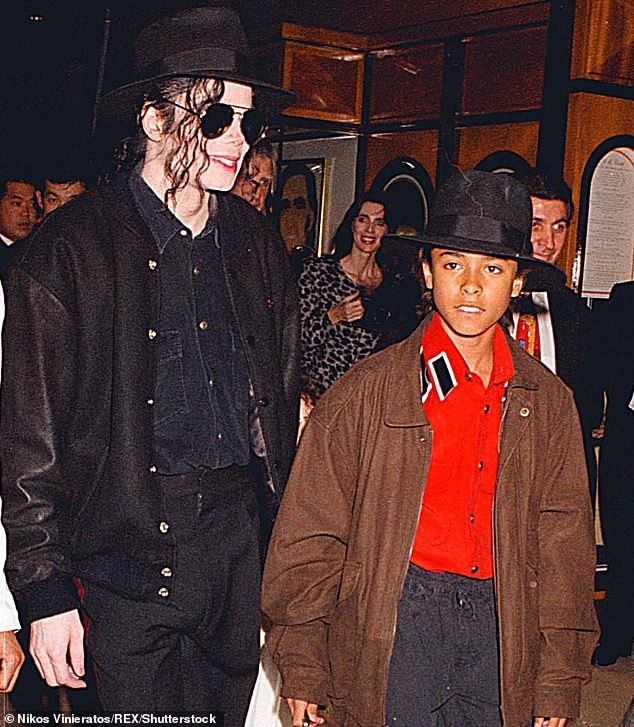 Michael Jackson and Jordan Chandler.
Michael Jackson and Jordan Chandler.
In 1993, Jackson met JordanŌĆÖs father, Evan Chandler, who was a screenwriter and celebrity dentist. Evan reportedly became ŌĆ£suspiciousŌĆØ that Jackson had sexually molested Jordan, and he hired a lawyer, Barry Rothman, who agreed to help, supposedly in exchange for dental treatments. David Schwartz taped several phone calls from Evan, which showed that he was clearly out to extort money from Jackson.
ŌĆ£This attorney I found ŌĆō I mean, I interviewed several, and I picked the nastiest son of a bitch I could find, and all he wants to do is get this out in the public as fast as he can, as big as he can and humiliate as many people as he can…
If I go through with this, I win big time. I will get everything I want. They will be destroyed forever.ŌĆØ
Schwartz played the first tape for Anthony Pellicano, a private investigator working for Bertram Fields, JacksonŌĆÖs attorney. Pellicano then questioned Jordan, who insisted that nothing inappropriate had occurred. Despite this, Evan Chandler accused Jackson of sexually abusing Jordan, who supposedly ŌĆ£confessedŌĆØ to Evan, although this is in doubt.[3] Evan was trying to get custody of Jordan, who had been staying with his father and had not been allowed to return home.
Represented by Rothman, Evan demanded $20 million from Jackson to not go public with the accusation. When Jackson refused, Evan took Jordan to a doctor, who heard his coerced allegations against Jackson. This triggered a criminal investigation, and Jordan was allowed to stay with Evan.
Meanwhile, Jackson had embarked on the Asian leg of his ŌĆ£DangerousŌĆØ world tour. While he was out of the country, Neverland was searched under warrant, as well as his Century City condominium and a hotel room in Las Vegas where he had stayed with the Chandlers. Tapes and other items were seized, but nothing incriminating was found. A copy of the report was leaked to the media, and a frenzy ensued; the tapes of Evan Chandler ranting to Schwartz were then released by Pellicano.
Evan sued David Schwartz and ex-wife June for invasion of privacy in leaking the tapes, and Schwartz counter-sued Evan Chandler. In this midst of this fracas, Larry Feldman, the Chandler lawyer, sued Jackson for $30 million. Jordan was then taken to a psychiatrist, where he made more detailed allegations. JacksonŌĆÖs lawyer countered with a letter to the LAPD complaining about the Chandlers trying to manipulate children into saying incriminating things about Jackson. The police interviewed 40-60 children who had spent time with Jackson, none of whom corroborated the ChandlersŌĆÖ story. In November 1993, Jackson cancelled his remaining concerts, in poor health and dependent on pain killers. He returned to the U.S. in December.
Michael Jackson statement regarding the strip-search he was required to undergo in 1993.
More unfortunate incidents followed, but we will make a long story short. Jackson was strip-searched and his body photographed and videotaped, for comparison with a description made by Jordan Chandler. Although the media reported that JordanŌĆÖs description matched ŌĆō which is still reported to this day ŌĆō it did not match, and no arrest warrant was issued.[4] In order to minimize the expense and the ordeal of a trial, JacksonŌĆÖs lawyers settled the civil case out of court for $15.3 million dollars to be placed in trust for Jordan, plus a reported $1.5 million for each of his parents and $5 million in legal fees. The settlement was paid by JacksonŌĆÖs insurance company and did not acknowledge any admission of guilt.
After the civil case had been settled, the criminal case continued. But Jordan Chandler refused to testify, and the grand juries disbanded without indicting Jackson. In 1995, Jordan Chandler legally emancipated himself from both his biological parents, and his whereabouts are unknown, although Dan Reed tried to find him for his film. After further attempts to extort money from Jackson, Evan Chandler committed suicide in 2009 after JacksonŌĆÖs death.
Chilean reporter Victor Gutierrez was one of the players in the case, serving as a source for false information fed to the media. In 1996, Gutierrez published a book, Michael Jackson Was My Lover: The Secret Diary of Jordie Chandler, which was totally fictional but considered by some to be credible (Jordan Chandler never kept a diary). You can get a copy of this slim paperback from AbeBooks.com for $400.
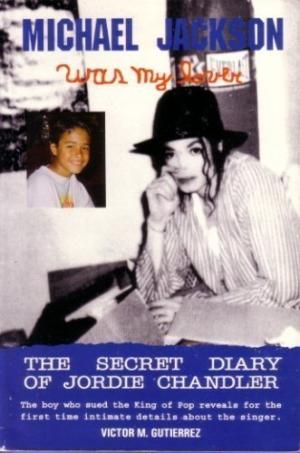
Interestingly, this book contains passages that are suspiciously close to some of the allegations of James Safechuck and Wade Robson against Jackson. It should be noted that both Robson and Safechuck were interviewed by the LAPD and provided witness statements during the Jordan Chandler inquiry, and both denied that anything inappropriate had happened between them and Jackson. In ŌĆ£Leaving Neverland,ŌĆØ they both claim to have lied to the authorities in 1993.
Gavin Arvizo and the 2005 Trial
The second major allegation of child molestation involved the Arvizo family, resulting in a grueling ordeal for Jackson that ended in his trial and acquittal in 2005.[5] Gavin Arvizo, age ten, was dying of cancer in 2000 when he asked to meet Michael Jackson. Jackson was told about his request and called him in the hospital. The Arvizo family met Jackson for the first time at Neverland after the first round of GavinŌĆÖs chemotherapy.
Gavin and his brother Star had asked to sleep in JacksonŌĆÖs bedroom, which he allowed them to do, but only after being begged by GavinŌĆÖs mother Janet. JacksonŌĆÖs two children, Prince and Paris, slept with the kids in the bed, and Jackson slept on the floor with his personal assistant Frank Cascio. The incident nonetheless caused an uproar when it was featured in the 2003 documentary ŌĆ£Living with Michael Jackson,ŌĆØ directed by Martin Bashir. The Arvizos did not accuse Jackson of molesting Gavin that night. However, they later claimed, without evidence, that Jackson and Cascio had shown the children pornography on a laptop that Jackson had given to Gavin.
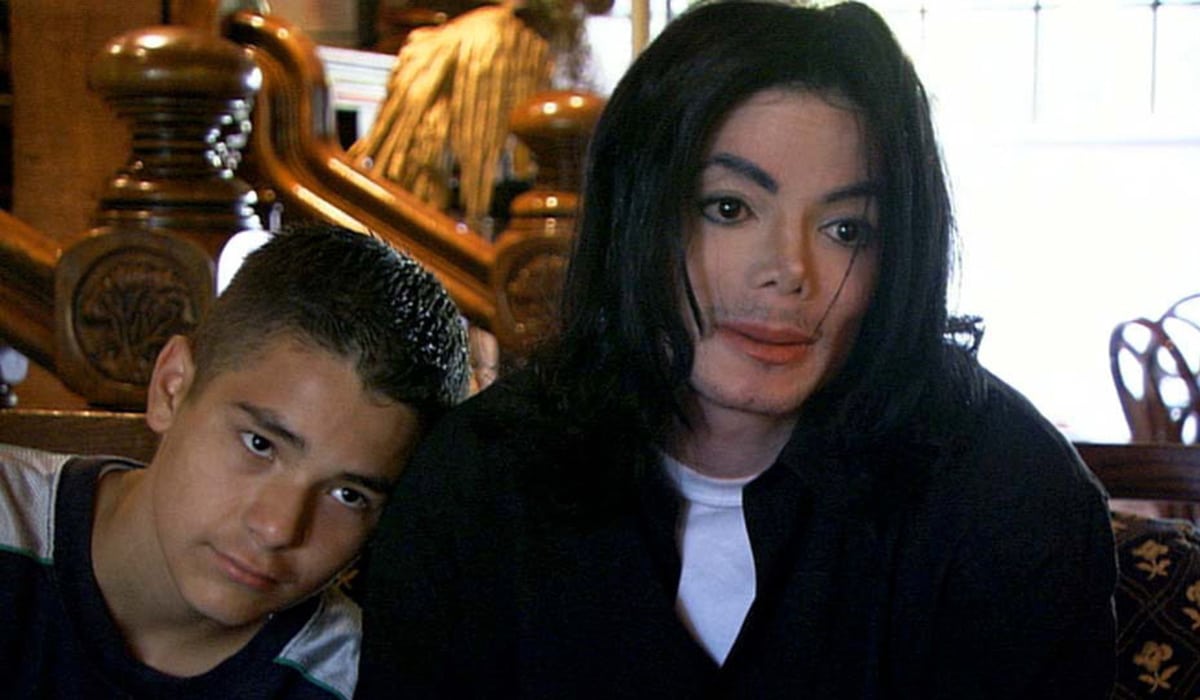 Gavin Arvizo and Michael Jackson in a scene from the Bashir documentary, ŌĆ£Living with Michael Jackson.ŌĆØ
Gavin Arvizo and Michael Jackson in a scene from the Bashir documentary, ŌĆ£Living with Michael Jackson.ŌĆØ
The Arvizos returned to Neverland in 2002 at the time of the filming of the Bashir documentary. For most of the Arvizo visits, Jackson was not home, but he did things to help them, such as allowing them to use Neverland for a blood drive, and giving them a van as a gift. GavinŌĆÖs parents separated in 2001, and Janet sued J.C. Penney over alleged abuse, eventually obtaining a settlement.┬ĀAs it turned out later, Gavin had been caught shoplifting, and his mother avoided the charge by accusing the guards of assault. At JacksonŌĆÖs 2005 trial, it was found that Janet had lied under oath in depositions in that case. In addition, Janet had committed welfare fraud. Like the Chandlers, the Arvizos were opportunistic grifters.
Martin Bashir was also dishonest, gaining the confidence of Jackson under false pretenses, cajoling and complimenting him on set, while cutting important sections of the film and adding negative commentary for the final version, making Jackson look quirky, negligent, and even dangerous. Jackson did not understand the agenda, speaking openly and allowing himself to be filmed holding hands with Gavin. The dialogue included the following:
-Bashir: But Michael, youŌĆÖre a 44-year-old man now. What do you get out of this?
-Jackson: I think what they get from me, I get from them. IŌĆÖve said it many times. My greatest inspiration comes from kids. Every song I write, every dance I do, all the poetry I write, is all inspired from that level of innocence, that consciousness of purity, and children have that. I see God in the face if children… I just love being around that all the time…
-Bashir: When people hear that children from other families have come, and theyŌĆÖve stayed in your house, theyŌĆÖve stayed in your bedroom, … and they say, is that really appropriate for a grown man to be doing that, how do you respond to that?
-Jackson: I feel sorry for them, because thatŌĆÖs judging someone who wants to really help people. Why canŌĆÖt you share your bed? The most loving thing to do is to share your bed with someone.
-Bashir: You really think that?
-Jackson: Yeah, of course…you can have my bed if you want. Sleep in it, IŌĆÖll sleep on the floor. ItŌĆÖs yours. Always give the best to the company…
-Bashir: Well, havenŌĆÖt you got a spare room or a spare house here where he could have stayed?
-Jackson: Yes, we have guest units. But whenever kids come here, they always want to stay with me…I have never invited them in my room. They always just want to stay with me. They say, ŌĆ£Can I stay with you tonight?ŌĆØ And I go, if itŌĆÖs OK with your parents, yes you can.
Toward the end of the film, Bashir returned to this conversation and added his own commentary, saying he had ŌĆ£found this easily the most disturbing moment of the past eight months.ŌĆØ Jackson volunteered that he had ŌĆ£slept in a bed with many children…ItŌĆÖs very right, itŌĆÖs very loving ŌĆō thatŌĆÖs what the world needs now, more love.ŌĆØ
A storm of bad publicity ensued, and JacksonŌĆÖs team moved to control the damage. His own camera man had shot extensive footage, and this was compiled into a second documentary, the so-called rebuttal video, ŌĆ£Michael Jackson, Take Two: The Footage You Were Never Meant to See.ŌĆØ ŌĆ£Take TwoŌĆØ was released two weeks later, containing material deliberately omitted by Bashir in order to manipulate the viewers. The Arvizos were filmed for ŌĆ£Take Two,ŌĆØ but in the end their segment was not included. Although they initially backed Jackson, they would soon change their story.
Meanwhile, Jackson was in Florida, where the Arvizos fled, trying to escape the media. Together they returned to Neverland, where the Arvizos were allowed to stay, although they subsequently claimed that they were held captive there against their will and forced to make the rebuttal film. A teacher at GavinŌĆÖs school had filed a complaint after seeing ŌĆ£Living with Michael Jackson,ŌĆØ and the Arvizos were visited by Child Protective Services. They supported Jackson at the time but later said they had been intimidated into doing so by ŌĆ£MichaelŌĆÖs people.ŌĆØ This began a long series of changing and conflicting allegations by the Arvizos,
The Santa Barbara County SheriffŌĆÖs Department also began an investigation, based on a complaint by psychiatrist Carol Lieberman, again due to the Bashir documentary. While all this was happening, the Arvizos claimed, Jackson began to molest Gavin. The Arvizos ŌĆ£escapedŌĆØ from Neverland on March 12, leaving for good. Between 2003 and 2005, the Arvizos told their story several times, to a psychologist, to the SheriffŌĆÖs Department in a series of interviews, to a grand jury in 2004, and finally at the 2005 trial.
The Arvizos accused Jackson of masturbating Gavin at least five times, supposedly observed by GavinŌĆÖs brother Star, in some cases when Gavin was passed out after having allegedly being plied with alcohol. The details were subject to change, with fluctuating descriptions, conflicting accounts, and disappearing claims, such that no coherent narrative materialized. With no corroborating evidence for the said molestation, the case eventually hinged on the credibility of Gavin and his family. Initially, some found the Arvizos credible, until it was discovered that they were all aspiring actors. No concrete evidence was ever presented to substantiate their unconvincing story.
Gavin Arvizo 2003 interview.
Gavin and his family were represented by William Dickerman and Larry Feldman, the lawyer who had negotiated the settlement for the Chandlers in the 1993 inquiry. Feldman had reported GavinŌĆÖs allegations to the Santa Barbara SheriffŌĆÖs Department, which was already investigating Jackson. In November 2003, a warrant was issued for his arrest; he turned himself in and was released on $3 million bail. Prior to the issuance of the warrant, in JacksonŌĆÖs absence, more than 70 members of the SheriffŌĆÖs Department had raided Neverland, ransacking the house and filming the process. To counteract the publicity from this footage, JacksonŌĆÖs team hired the film maker Larry Nimmer to produce a documentary on Neverland, which was shown to the jury at the trial. Nimmer has just released an updated version of this film to include a rebuttal of ŌĆ£Leaving Neverland.ŌĆØ
In April 2004, Jackson was indicted on 10 counts of lewd acts upon a child, administering an intoxicating agent to assist in commission of a felony, and conspiracy. The People v. Michael Jackson went to trial in February 2005, under District Attorney Thomas Sneddon, who had overseen the 1993 investigation. Sneddon, who felt cheated out of a conviction in 1993, was determined to get one this time and pulled out all the stops.
Jackson was represented by attorneys Mark Geragos and Thomas Mesereau, who has continued to speak out in support of Jackson. Numerous witnesses testified for the defense, including Macaulay Culkin, and the 22-year-old Wade Robson. RobsonŌĆÖs sworn testimony of May 5, 2005, the equivalent of 86 pages of court transcripts, includes the following.[6]
-Mesereau: Do you consider Michael Jackson your friend?
-Robson: Yes.
-Mesereau: Do you consider him a close friend?
-Robson: Yes.
-Mesereau: YouŌĆÖre aware of the allegations in this case, are you not?
-Robson: Yes.
-Mesereau: And are you aware, as you sit here today, that thereŌĆÖs been allegations that Mr. Jackson molested you?
-Robson: Yes.
-Mesereau: Mr. Robson, did Michael Jackson ever molest you at any time?
-Robson: Absolutely not.
-Mesereau: Mr. Robson, did Michael Jackson ever touch you in a sexual way?
-Robson: Never, no.
-Mesereau: Mr. Robson, has Mr. Jackson ever inappropriately touched any part of your body at any time?
-Robson: No.
…
-Mesereau: Has Mr. Jackson ever helped you with your career?
-Robson: Yes.
…
-Mesereau: Mr. Robson, has anyone told you what to say in this courtroom today?
-Robson: No.
-Mesereau: Is everything youŌĆÖve said the complete and honest truth?
-Robson: Yes.
-Mesereau: Did Mr. Jackson ever do anything wrong with you?
-Robson: No.
In 2004 at the height of the Arvizo investigation, Evan ChandlerŌĆÖs brother Raymond published All That Glitters: The Crime and the Cover-up, a book about the Chandler inquiry, widely considered to have been ghostwritten by Evan. Jordan Chandler was visited by prosecutors in the Arvizo trial and asked to testify but he refused, saying that he would legally fight any attempt to make him do so. Thomas Mesereau later revealed that Jordan had admitted to several people that Jackson had not molested him, and these witnesses would have been presented if Jordan had testified. JordanŌĆÖs mother June did testify at the Arvizo trial, saying that she had not witnessed any molestation of her son by Jackson.
On June 13, 2005, Michael Jackson was acquitted of all charges.
In 2013, Gavin Arvizo was married at age 24 in Atlanta in a joint Catholic-Baptist ceremony. Guests included Santa Barbara District Attorney Ron Zonen, who prosecuted the case against Michael Jackson. Also present was GavinŌĆÖs mother Janet, who has since married Army Lt. Colonel Jay Jackson ŌĆō so her name is now Janet Jackson.
Leaving Neverland: The New Allegations
The new film features detailed interviews with Wade Robson and James Safechuck, who have radically changed their stories about their relationship with Jackson. Whereas both went on record to defend the star in 1993, and Wade testified under oath in JacksonŌĆÖs defense in 2005, they are now retailing outlandish stories of sexual molestation. Both say that Jackson tried to turn them against their families and poison them against women.
The two men have sued the Jackson estate and companies for monetary compensation, alleging they were sexually assaulted by Jackson as young boys (Robson fourth amended complaint, ┬Č5; Safechuck second amended complaint, ┬Č5).[7] ┬ĀThe suits claim that Jackson and his companies, MJJ Productions and MJJ Ventures, operated what was ŌĆ£likely the most sophisticated public child sexual abuse procurement and facilitation organization the world has known.ŌĆØ Really?
Both lawsuits were dismissed in 2017, but the men have appealed. While ŌĆ£Leaving NeverlandŌĆØ is based on the complaints filed, it does not follow them exactly. Additional problems with the narrative were immediately apparent, and important discrepancies have continued to crop up. These and other issues are reviewed in ŌĆ£A Critical Analysis of ŌĆśLeaving NeverlandŌĆÖŌĆØ and an update is given below. As the film is purportedly about Wade and James, according to director Dan Reed, one must examine these two characters ŌĆō who, by the way, are both professional actors.
WADE ROBSON┬Ā(b. September 17, 1982) is a dancer, choreographer, actor, and film maker ŌĆō and also a known liar, if tweets by his colleagues and others are to be believed. In a note for a 2012 book, he called himself ŌĆ£a master of deception.ŌĆØ In his complaint and in ŌĆ£Leaving Neverland,ŌĆØ Wade says that Jackson molested him starting at age seven for seven years (1990 through 1996). The abuse supposedly began when he was left behind at Neverland by his family, who went on a trip to the Grand Canyon without him. He says that Jackson sexually abused him every night during that week and whenever and wherever he got the chance thereafter.
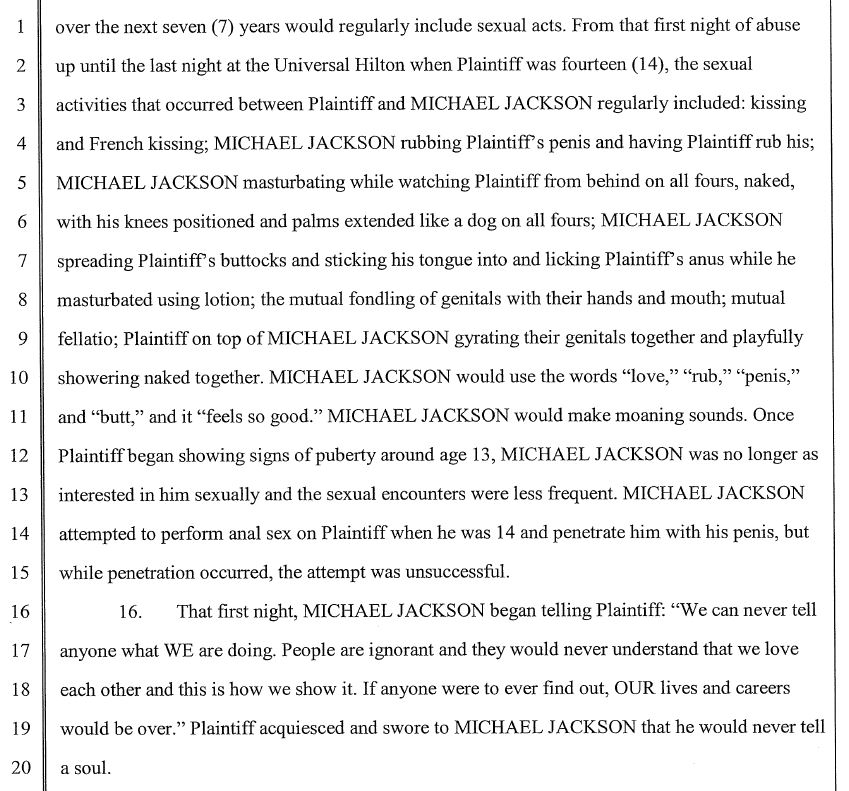 Wade RobsonŌĆÖs fourth amended complaint, ┬Č15-16.
Wade RobsonŌĆÖs fourth amended complaint, ┬Č15-16.
Robson alleges that Jackson masturbated while watching him ŌĆ£on all fours,ŌĆØ fondled his genitals, and licked his anus, while moaning and saying, it ŌĆ£feels so good.ŌĆØ On the first night of these alleged capers (around February 4, 1990), Jackson supposedly told Wade, ŌĆ£We can never tell anyone what we are doing…If anyone were to ever find out, our lives and careers would be over.ŌĆØ JacksonŌĆÖs interest reportedly waned after Robson reached puberty. (Robson fourth amended complaint, ┬Č14-16). Complete details are available at ŌĆ£The Michael Jackson Allegations.ŌĆØ
In ŌĆ£Leaving Neverland,ŌĆØ Robson is presented as a successful showbiz celebrity, but the reality is somewhat different. He was a choreographer for Britney Spears and NSYNC in the early 2000s, and he has danced in film and on tour. The winner of two prime time Emmy awards for outstanding choreography (2007 and 2008), he aspired to direct his own dance films. In 2010 he was given the chance to direct ŌĆ£Step Up RevolutionŌĆØ (released in 2012), but in 2011 he folded under the pressure and had a nervous breakdown. On May 16, 2011, he began therapy.
Five days later, Robson wrote an email to Cirque du Soleil, asking to be hired to direct or choreograph ŌĆ£One,ŌĆØ the production about Michael Jackson that opened in 2013 and is still playing┬Ā at the Mandalay Bay in Las Vegas. However, another choreographer, Jamie King, was hired to direct the show. Despite being passed over, Wade claimed in an interview in July that he had taken on a leading creative role in ┬Āthe production. In March 2012, he suffered a second breakdown, after which he said he was unable to work, with the attendant financial problems. WadeŌĆÖs wife, Amanda Rodriguez, had reportedly threatened to leave him if he could not pull himself together. Amanda, who is an actress, was a member of the supporting cast of ŌĆ£Leaving Neverland.ŌĆØ
In April 2012 Robson went to a new therapist, and in May 2012 he had his ŌĆ£realizationŌĆØ that he was molested by Jackson. He said this was triggered by his infant son, who ŌĆ£became a profound access point to little Wade.ŌĆØ In late 2012/early 2013 Robson shopped a book about this, reportedly asking for a substantial advance, but he found no takers. On May 1, 2013, Wade filed a creditorŌĆÖs claim against Michael JacksonŌĆÖs estate and a civil suit against the Jackson companies, MJJ Productions and MJJ Ventures, allegedly for $1.5 billion (Robson fourth amended complaint). He claimed that the alleged abuse by Jackson, rather than the pressures of his career, had caused his breakdowns. On May 8, 2013, the case became public with a story at TMZ; on May 16, Robson discussed the allegations in an interview on The Today Show with Matt Lauer.
“Michael Jackson and Wade Robson: The Real Story.”
Wade Robson first met Michael Jackson in Australia on November 27, 1987. Five-year-old Wade won a dancing contest in Brisbane, for which the prize was a ŌĆ£meet and greetŌĆØ with Jackson, who was then on his ŌĆ£BadŌĆØ world tour. Jackson met Wade on his two-day stop in Brisbane (November 27-28) and invited him to join him on stage the following night, as he frequently did with children.
Robson would later claim that ŌĆ£meet and greetsŌĆØ such as the one in Brisbane were an orchestrated ŌĆ£sexual grooming mechanism to acquire minor sexual abuse victims for Michael Jackson, disguised as charitable events for minorsŌĆØ (Robson fourth amended complaint, ┬Č11).
This allegation was directed against JacksonŌĆÖs companies MJJ Productions and MJJ Ventures, although the Brisbane event was actually sponsored by Target, Pepsi, and CBS. WadeŌĆÖs mother Joy contradicted his claim in her 2016 deposition, revealing that the event was large and Wade had only spent a few minutes with Jackson, invited to dance with him later on stage. Joy sent Jackson a thank you note and received an invitation to meet briefly at his hotel. She followed up with letters and videos of Wade sent to Jackson, but did not get a response.
Thereafter, Joy Robson promoted her sonŌĆÖs career in earnest. The family traveled to Disneyland in early 1990 so that Wade and his sister Chantal could perform there with a talent school. Joy managed to hunt down Jackson and score an invitation to Neverland, his fabulous estate. Wade would later allege that this is when his ŌĆ£abuseŌĆØ began, at age 7, lasting for 7 years until he was 14. The graphic but unsubstantiated allegations are laid out in RobsonŌĆÖs complaint and aired in ŌĆ£Leaving NeverlandŌĆØ (fourth amended complaint, ┬Č15).
In September 1991 Joy Robson moved with Wade and Chantal to Los Angeles, so that Wade could pursue a career in show business. According to RobsonŌĆÖs complaint, this was arranged by Jackson and his companies ŌĆ£for the explicit purpose of allowing Michael Jackson access to [Wade] for sexual abuseŌĆØ (fourth amended complaint, ┬Č23). However, it was the RobsonsŌĆÖ idea to immigrate, and they asked Jackson to sponsor them, as that was the only way they could stay in the US. After the Robsons moved to Los Angeles, Jackson did not spend much time with them, according to Joy. Their interactions were occasional and sporadic, and it was Joy who had to call Jackson to ask him to help Wade.
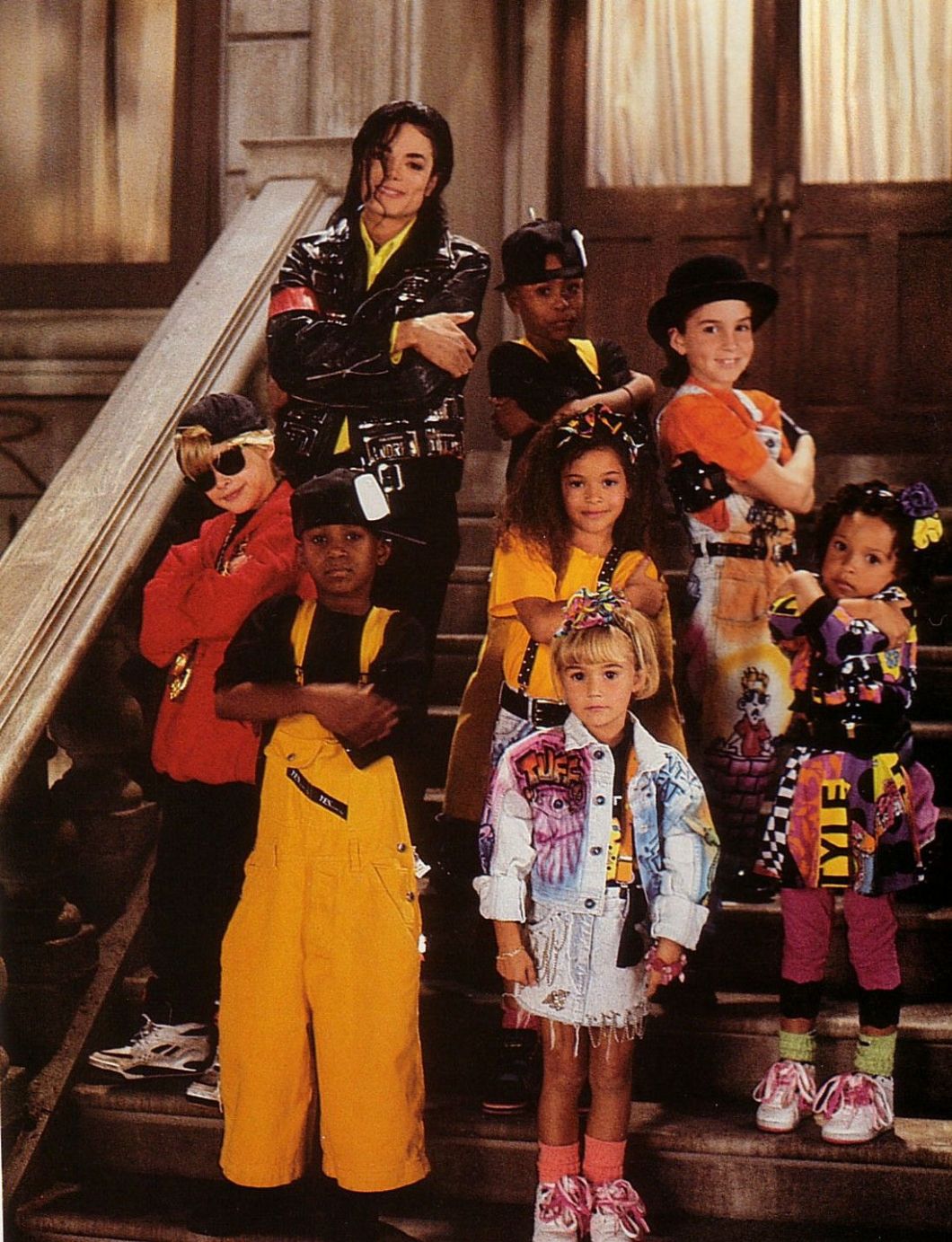 Still from the ŌĆ£Black or WhiteŌĆØ music video, featuring┬ĀMacaulay Culkin (left) and Wade Robson (right).
Still from the ŌĆ£Black or WhiteŌĆØ music video, featuring┬ĀMacaulay Culkin (left) and Wade Robson (right).
Nonetheless, Jackson mentored Wade, coaching him in dance and giving him minor roles in three of his music videos: ŌĆ£Black or WhiteŌĆØ (1991), ŌĆ£JamŌĆØ (1992), and ŌĆ£Heal the WorldŌĆØ (1992). Robson idolized Jackson from the age of two when his mother showed him a video of ŌĆ£The Making of Thriller.ŌĆØ He spoke fondly about Jackson, often praising him effusively, and he repeatedly denied that he had ever been sexually abused. Until he came to the ŌĆ£realizationŌĆØ that he had been molested, calling Jackson a pedophile.
One can speculate on the origins of RobsonŌĆÖs story. Clearly he had done research on victims of sexual abuse and child pornography. He had certainly read Victor GutierrezŌĆÖs fictional book, Michael Jackson Was My Lover: The Secret Diary of Jordie Chandler, where Wade appears as one of JacksonŌĆÖs ŌĆ£loversŌĆØ and even has his own chapter.[8] Wade also plied his mother with questions about their relationship with Michael, and relied heavily on her recollections. The exact narrative was devised by his legal team in order to get around the statutes of limitations and other requirements for filing, with certain features taken from the book by Gutierrez, particularly regarding the alleged culpability of JacksonŌĆÖs companies. Robson, as well as Safechuck, was initially represented by Gradstein & Marzano, and switched to Manly, Stewart & Finaldi in 2016. Thus, the outlines of RobsonŌĆÖs convoluted story were established by his first team of lawyers, with amendments made later.
As noted above in terms of the Chandler and Arvizo allegations, Robson testified in both cases that Jackson had never molested him. So was he was lying then, or is he lying now? As to why he has now changed his story, he says that Jackson had warned him not to say a word about their relationship, because if anyone found out, ŌĆ£our lives and careers would be overŌĆØ (fourth amended complaint, ┬Č16).
For the requirements of his legal claim, he needed to state that he did not realize that his abuse was ŌĆ£abuseŌĆØ until recently. Thus the phony man-boy ŌĆ£loveŌĆØ story between Robson and Jackson, which harks back to the main premise of the fake diary by Victor Gutierrez. After WadeŌĆÖs civil suit was dismissed in 2017, he declared himself ŌĆ£healed,ŌĆØ presumably since he had to go back to work for a living. He filed an appeal, which is now pending.
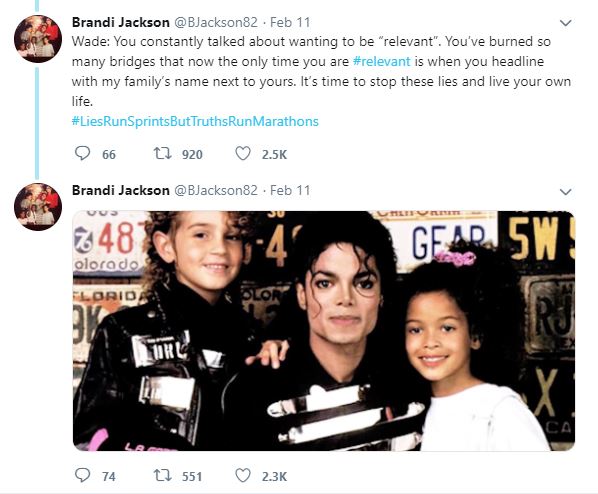 Wade, Michael, and Brandi, who appeared together in 1991 in an LA Gear commercial.
Wade, Michael, and Brandi, who appeared together in 1991 in an LA Gear commercial.
ŌĆ£Leaving NeverlandŌĆØ has put Wade Robson back in the spotlight, along with his allegations of child sexual abuse. With the imprimatur of Oprah Winfrey and Dan Reed, Robson has enjoyed an outpouring of media sympathy. Unfortunately for Robson, however, JacksonŌĆÖs niece Brandi has come forth to say that Wade had asked her to be his girlfriend when they were first introduced as youngsters. From 1991 to around 2000 they were close friends and then a couple, dating for 7 years. This includes the period when Wade says that Jackson molested him. Brandi says that it never occurred. She calls Wade Robson a liar. Not only had Jackson not tried to poison Robson against women, he had fixed him up with his own niece.
At WadeŌĆÖs 2016 deposition, the Jackson family presented a memo he had written: ŌĆ£My story of abuse and its effects will make me relatable/relevant.ŌĆØ Brandi has tweeted: ŌĆ£…now the only time you are #relevant is when you headline with my familyŌĆÖs name next to yours. ItŌĆÖs time to stop these lies and live your own life.ŌĆØ JacksonŌĆÖs nephew Taj has also been giving interviews and is planning a documentary. In a two-part radio interview with John Ziegler, Taj and Brandi discuss the claims of Robson and Safechuck and why their preposterous allegations should not be taken seriously. This has gotten limited play in the media, although lots of exposure on YouTube and Twitter, with numerous short films and thousands of ŌĆ£likesŌĆØ at @BJackson82, @TajJackson3, #MJFam, #MJInnocent, #MJJLegion, #LeavingNeverlandLies, #WadeRobsonIsALiar, @Hammertonhal, and elsewhere. The story of Wade and Brandi is a bombshell waiting to fully detonate.
More bad news: Jackson biographer Mike Smallcombe has challenged a major contention of RobsonŌĆÖs ŌĆō that he stayed alone at Neverland with Jackson in 1990 while the rest of his family went to the Grand Canyon. It is at that time, Wade says, that he was first molested by Jackson. However, Joy Robson testified in 1993/1994 that the entire family went to the Grand Canyon and then returned to Neverland the following weekend. No mention of leaving little Wade behind at the mercy of Jackson. Joy said that Wade was never at Neverland without her before 1993.
JAMES SAFECHUCK┬Ā(b. February 28, 1978) is a dancer, film director, and actor, who, like Wade Robson, was unable to meet his expectations for success in show business. He is now a computer programmer. His IMDb entry shows he is ŌĆ£known forŌĆØ work as an editorial assistant on ŌĆ£Dude, WhereŌĆÖs My Car?ŌĆØ When his wife first met him, he was playing guitar with a band in a bar. Safechuck alleges that he was molested by Jackson for four years, from 1988 through 1992 (Safechuck second amended complaint, ┬Č36). According to his complaint, when James ŌĆ£fully reached puberty,ŌĆØ JacksonŌĆÖs ŌĆ£sexual abuseŌĆØ finally stopped (┬Č63). As with Wade Robson, this alleged abuse was supposedly not recognized as ŌĆ£abuseŌĆØ but nonetheless left a lasting impression.
In May 2013 James saw on the news that Robson had filed suit against the Jackson estate, and his ŌĆ£feelings of panic and anxiety heightenedŌĆØ (second amended complaint, ┬Č81) After this, he met with a psychiatrist in 2013, when he was first able to discus the alleged abuse during treatment. Because of the statute of limitations, Safechuck ŌĆō like Robson ŌĆō needed to show that his realization of this abuse was recent, such that he could not have brought the claim earlier. And although he reportedly knew he had been abused in 2005, as claimed by Reed, he had not connected his life problems with this abuse, which he was finally able to do in 2013. Nonetheless, he has not been successful with his lawsuit. After substantial resistance from the Jackson legal team, James was forced to amend his complaint several times, and in 2017 his suit was dismissed.
James Safechuck in the Michael Jackson Pepsi commercial.
ŌĆ£JimmyŌĆØ Safechuck was a child model who had been acting in commercials, when he scored a Pepsi commercial with Michael Jackson in 1986/1987. His mother, Stephanie, was a tough stage mom, like Joy Robson. In ŌĆ£Leaving Neverland,ŌĆØ Stephanie says she was told by a friend to put her young son in commercials, and an agent told her, ŌĆ£HeŌĆÖs money in the bank.ŌĆØ Like Wade Robson, Jimmy Safechuck is featured in Victor GutierrezŌĆÖs book, and his story draws on GutierrezŌĆÖs material.[9] SafechuckŌĆÖs claims are similar to those of Robson, and he too finds a way to accuse JacksonŌĆÖs companies. His story is constructed in much the same manner, organized around the statutes of limitations and other legal restrictions pertaining to his lawsuit; the two men have the same team of lawyers.
Some months after the Pepsi commercial, Jackson invited the Safechuck family to dinner at his Hayvenhurst home in Encino, CA. On Thanksgiving (November 26, 1987) Jackson was supposedly on the phone with James, and the Safechucks invited him to their house for Thanksgiving dinner. Jackson reportedly accepted, and the family drove to Hayvenhurst to pick him up (Safechuck second amended complaint, ┬Č13). Unfortunately for JamesŌĆÖs account, however, Jackson was traveling for his ŌĆ£BadŌĆØ tour on Thanksgiving 1987. November 26 in California was November 27 in Brisbane, where he was performing that very day. It seems that instead of having dinner with the Safechucks, Jackson was meeting Wade Robson in Australia. SafechuckŌĆÖs story starts to fall apart here, and has continued to crumble.
After the alleged Thanksgiving dinner, Jackson was supposedly in constant contact with James and ŌĆ£had become like a part ofŌĆØ his family. In 1988, James and his mother traveled with Jackson to Hawaii for a convention where the Pepsi commercial was featured. Jackson supposedly asked if James could sleep in his room, although his mother did not allow it. Jackson had rented out an amusement park in Hawaii for everyone to visit, and James met Michael J. Fox at the convention. The Safechucks were treated like VIPs, which made a big impression (second amended complaint, ┬Č19-21).
In 1988, Jackson allegedly began to sleep over at the SafechucksŌĆÖ house, where he supposedly stayed in JamesŌĆÖs bedroom (second amended complaint, ┬Č24).┬Ā The same year, James and Stephanie traveled with Jackson to New York and Florida, and then to Paris on his ŌĆ£BadŌĆØ tour, where the first instance of alleged abuse occurred. This was reportedly described by Jackson as ŌĆ£showing loveŌĆØ (┬Č31). On another occasion, Jackson supposedly masturbated while having James ŌĆ£rub and suckŌĆØ his nipples (┬Č38), which he also mentions in ŌĆ£Leaving Neverland.ŌĆØ This is straight out of GutierrezŌĆÖs book.[10] Other activities alleged are much like those described by Robson.
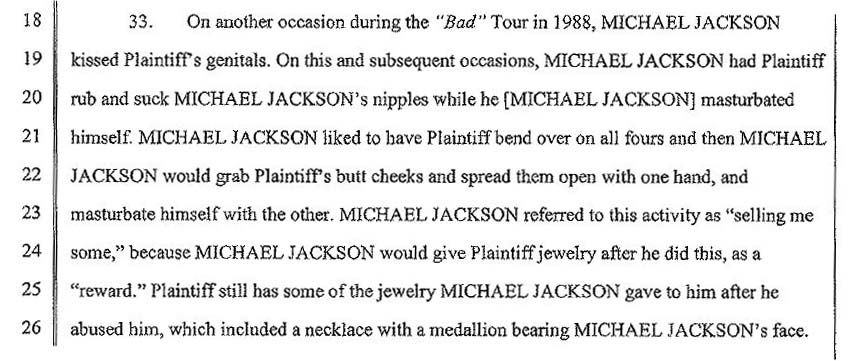
James SafechuckŌĆÖs second amended complaint, ┬Č33.
The jewelry episode in ŌĆ£Leaving NeverlandŌĆØ is one of the most poignant fake moments in the film. Safechuck pulls a few rings and a gold charm out of a small jewelry box with a shaking hand. He talks about his love for Jackson and says ŌĆ£we were like this married coupleŌĆØ that had a ŌĆ£mock wedding ceremonyŌĆØ in his bedroom. This ŌĆ£fake marriage,ŌĆØ along with a wedding ring and signed certificate, also appears in SafechuckŌĆÖs complaint (second amended complaint, ┬Č54). ŌĆ£ItŌĆÖs hard to go back to that moment,ŌĆØ says James in the film, looking pained. The media jumped on this episode, digging up an old report about Jackson (in disguise) and Safechuck shopping for jewelry at Zales. This was caught on CCTV, although the tape actually shows the two in the nearby ŌĆ£Gift Bazaar,ŌĆØ and they are not buying jewelry. Of course, none of this constitutes proof of the allegation.
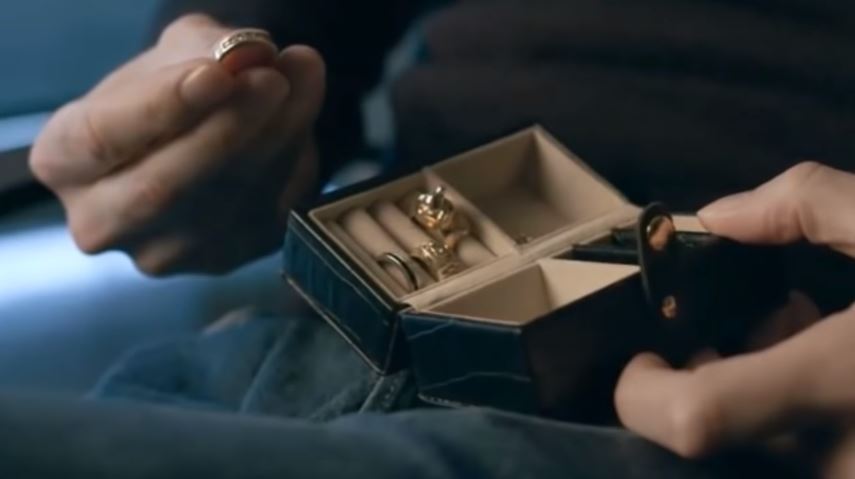 SafechuckŌĆÖs brand new jewelry box with rings he says Jackson gave him when he was a boy.
SafechuckŌĆÖs brand new jewelry box with rings he says Jackson gave him when he was a boy.
James says that Jackson ŌĆ£engaged in sexual actsŌĆØ with him ŌĆ£hundreds of times,ŌĆØ on tour and at his various houses (second amended complaint, ┬Č56). This included a romantic trip to New York City for James after JacksonŌĆÖs performance at the Grammy Awards in February 1989, where he allegedly slept with Jackson in his hotel room and was sexually abused (┬Č35). The only problem with this incident is that it never happened. In 1989 the Grammy Awards were held in Los Angeles. And Jackson performed at the Grammy Awards in 1988 in New York. This blooper did not appear in ŌĆ£Leaving Neverland.ŌĆØ
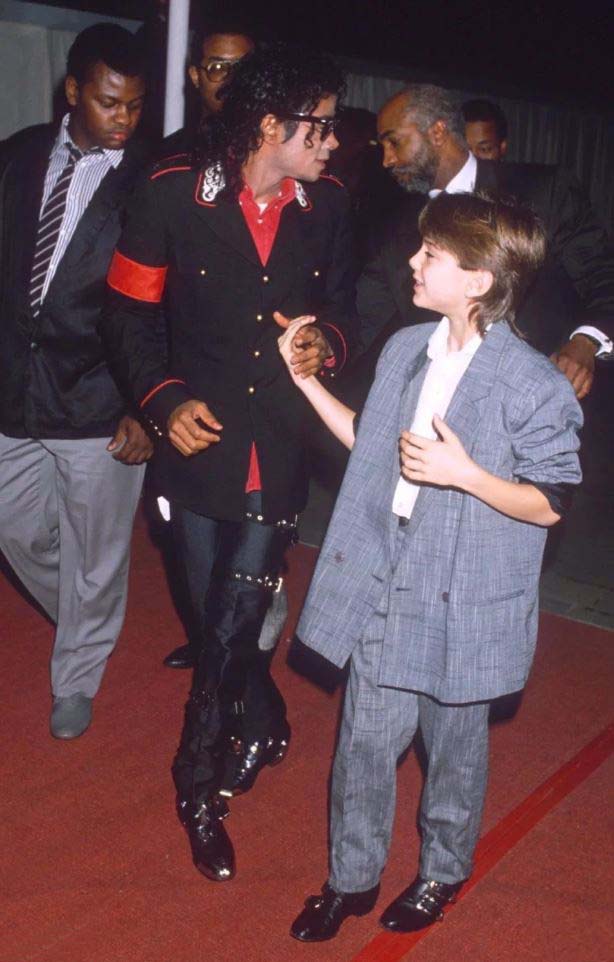 Michael Jackson and James Safechuck, 1988. Image: The Sun.
Michael Jackson and James Safechuck, 1988. Image: The Sun.
One of the most curious anomalies in SafechuckŌĆÖs allegations is his motherŌĆÖs statement in ŌĆ£Leaving NeverlandŌĆØ that she danced for joy when Jackson died in 2009, because he would not be able to harm any more children. This is strange, because James allegedly did not even realize he had been abused until 2013. According to Dan Reed, James told his mother about the abuse in 2005. However, James claims that told his mother that Jackson was a ŌĆ£bad manŌĆØ and ŌĆ£not a good personŌĆØ ŌĆō he says he told her only that ŌĆ£something had happenedŌĆØ but nothing more specific (Safechuck supplemental declaration, ┬Č15). This is not the same as telling her that Jackson had sexually abused him, although he alluded to this in his second amended complaint (┬Č74).
Indeed, we donŌĆÖt know if James told his mother anything in 2005. This episode is supposedly related to the allegation that Jackson had begged James to testify in his defense in the 2005 trial. According to James, Jackson had contacted him about testifying and, when James said no, he ŌĆ£got angry and threatened him.ŌĆØ (Safechuck second amended complaint, ┬Č73).┬ĀJackson then reportedly called JamesŌĆÖs mother Stephanie to get her to convince James to testify, and to ask both parents to testify as well. However, this entire scenario was invented. Actually, James was never a candidate for testimony in the 2005 trial. For the purposes of this trial, he had been considered a ŌĆ£non-entity,ŌĆØ as he was deemed unrelated to the Arvizo allegations. Furthermore, Jackson would not have contacted either James or his mother about testifying, as this was the job of court officials.
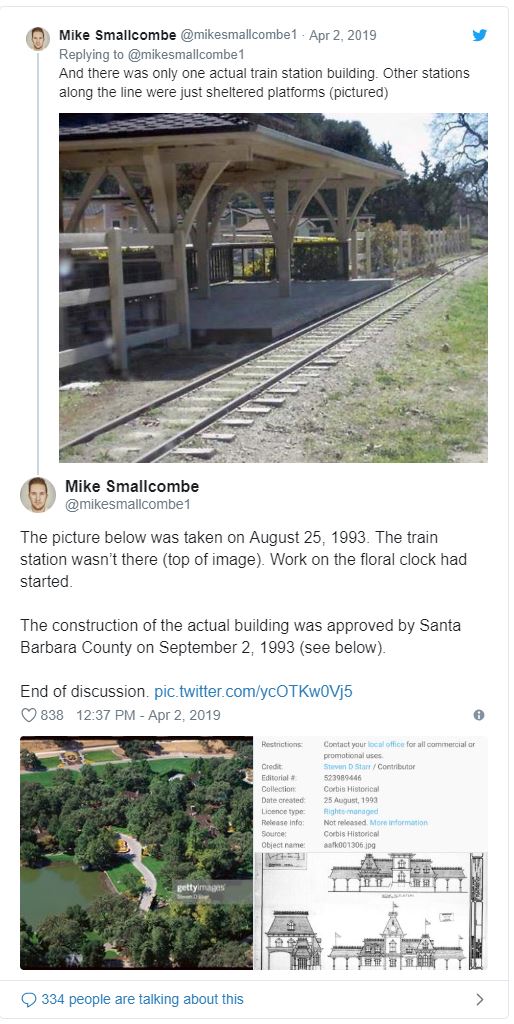
JamesŌĆÖs story in ŌĆ£Leaving NeverlandŌĆØ has now been poked full of holes, most recently in terms of his allegations regarding the train station, where he said he and Jackson ŌĆ£would have sexŌĆØ in the upstairs room many times. However, he had said his molestation lasted from 1988 through 1982, ending when he was 14 years old. Unfortunately for James, the train station was not built until 1994, which was discovered by Jackson biographer Mike Smallcombe. John ZieglerŌĆÖs tirade on this blunder is hilarious.
The stories of Safechuck and Robson were carefully constructed so that their lawsuits could proceed within the legal limitations. Not carefully enough, however, as research shows. Still, although their lawsuits have been thrown out of court, both men have appealed. Along comes ŌĆ£Leaving Neverland,ŌĆØ providing support for the stories and the accusers, who hope to get their cases reinstated. Meanwhile, the filmŌĆÖs director, Dan Reed, is also a person of interest.
CLICK FOR PART II
